Deck 3: Polynomial and Rational Functions
Question
Question
Question
Question
Question
Question
Question
Question
Question
Question
Question
Question
Question
Question
Question
Question
Question
Question
Question
Question
Question
Question
Question
Question
Question
Question
Question
Question
Question
Question
Question
Question
Question
Question
Question
Question
Question
Question
Question
Question
Question
Question
Question
Question
Question
Question
Question
Question
Question
Question
Question
Question
Question
Question
Question
Question
Question
Question
Question
Question
Question
Question
Question
Question
Question
Question
Question
Question
Question
Question
Question
Question
Question
Question
Question
Question
Question
Question
Question
Question

Unlock Deck
Sign up to unlock the cards in this deck!
Unlock Deck
Unlock Deck
1/84
Play
Full screen (f)
Deck 3: Polynomial and Rational Functions
1
From the graph of the quadratic function  , determine the equation of the axis of symmetry.
, determine the equation of the axis of symmetry.
A)
B)
C)
D)
E)
 , determine the equation of the axis of symmetry.
, determine the equation of the axis of symmetry.A)

B)

C)

D)

E)


2
Write the quadratic function,  , in standard form.
, in standard form.
A)
B)
C)
D)
E)
 , in standard form.
, in standard form.A)

B)

C)

D)

E)


3
From the graph of the quadratic function  , determine the equation of the axis of symmetry.
, determine the equation of the axis of symmetry.
A)
B)
C)
D)
E)
 , determine the equation of the axis of symmetry.
, determine the equation of the axis of symmetry.A)

B)

C)

D)

E)


4
Find the standard form of the quadratic function shown below: 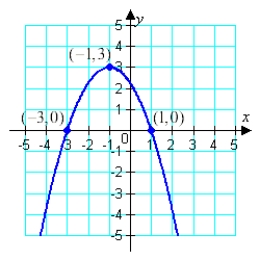
A)
B)
C)
D)
E)

A)

B)

C)

D)

E)


Unlock Deck
Unlock for access to all 84 flashcards in this deck.
Unlock Deck
k this deck
5
Find two positive real numbers whose product is a maximum and whose sum is  .
.
A)
B)
C)
D)
E)58, 82
 .
.A)

B)

C)

D)

E)58, 82

Unlock Deck
Unlock for access to all 84 flashcards in this deck.
Unlock Deck
k this deck
6
Write the standard form of the equation of the parabola that has a vertex at  and passes through the point
and passes through the point  .
.
A)
B)
C)
D)
E)
 and passes through the point
and passes through the point  .
.A)

B)

C)

D)

E)


Unlock Deck
Unlock for access to all 84 flashcards in this deck.
Unlock Deck
k this deck
7
Write the quadratic function,  , in standard form.
, in standard form.
A)
B)
C)
D)
E)
 , in standard form.
, in standard form.A)

B)

C)

D)

E)


Unlock Deck
Unlock for access to all 84 flashcards in this deck.
Unlock Deck
k this deck
8
Determine the x-intercept(s) of the quadratic function  .
.
A)
B)
C)
D)
E)no x-intercept(s)
 .
.A)

B)

C)

D)

E)no x-intercept(s)

Unlock Deck
Unlock for access to all 84 flashcards in this deck.
Unlock Deck
k this deck
9
Describe the right-hand and the left-hand behavior of the graph of  .
.
A)Because the degree is even and the leading coefficient is negative, the graph falls to the left and falls to the right.
B)Because the degree is even and the leading coefficient is negative, the graph rises to the left and falls to the right.
C)Because the degree is even and the leading coefficient is negative, the graph falls to the left and rises to the right.
D)Because the degree is even and the leading coefficient is negative, the graph rises to the left and rises to the right.
E)Because the degree is odd and the leading coefficient is negative, the graph rises to the left and rises to the right.
 .
.A)Because the degree is even and the leading coefficient is negative, the graph falls to the left and falls to the right.
B)Because the degree is even and the leading coefficient is negative, the graph rises to the left and falls to the right.
C)Because the degree is even and the leading coefficient is negative, the graph falls to the left and rises to the right.
D)Because the degree is even and the leading coefficient is negative, the graph rises to the left and rises to the right.
E)Because the degree is odd and the leading coefficient is negative, the graph rises to the left and rises to the right.

Unlock Deck
Unlock for access to all 84 flashcards in this deck.
Unlock Deck
k this deck
10
Find two positive real numbers whose product is a maximum and whose sum of the first number and four times the second is  .
.
A)
B)
C)
D)
E)
 .
.A)

B)

C)

D)

E)


Unlock Deck
Unlock for access to all 84 flashcards in this deck.
Unlock Deck
k this deck
11
Compare the graph of  with
with  .
.
A) shifts right
shifts right  units, shifts downward
units, shifts downward  units, and shrinks by a factor of
units, and shrinks by a factor of  .
.
B) shifts right
shifts right  units, shifts upward
units, shifts upward  units, and stretches by a factor of
units, and stretches by a factor of  .
.
C) shifts left
shifts left  units, shifts downward
units, shifts downward  units, and stretches by a factor of
units, and stretches by a factor of  .
.
D) shifts right
shifts right  units, shifts upward
units, shifts upward  units, and shrinks by a factor of
units, and shrinks by a factor of  .
.
E) shifts left
shifts left  units, shifts upward
units, shifts upward  units, and stretches by a factor of
units, and stretches by a factor of  .
.
 with
with  .
.A)
 shifts right
shifts right  units, shifts downward
units, shifts downward  units, and shrinks by a factor of
units, and shrinks by a factor of  .
.B)
 shifts right
shifts right  units, shifts upward
units, shifts upward  units, and stretches by a factor of
units, and stretches by a factor of  .
.C)
 shifts left
shifts left  units, shifts downward
units, shifts downward  units, and stretches by a factor of
units, and stretches by a factor of  .
.D)
 shifts right
shifts right  units, shifts upward
units, shifts upward  units, and shrinks by a factor of
units, and shrinks by a factor of  .
.E)
 shifts left
shifts left  units, shifts upward
units, shifts upward  units, and stretches by a factor of
units, and stretches by a factor of  .
.
Unlock Deck
Unlock for access to all 84 flashcards in this deck.
Unlock Deck
k this deck
12
Describe the right-hand and the left-hand behavior of the graph of  .
.
A)Because the degree is odd and the leading coefficient is positive, the graph falls to the left and falls to the right.
B)Because the degree is odd and the leading coefficient is negative, the graph rises to the left and falls to the right.
C)Because the degree is odd and the leading coefficient is negative, the graph falls to the left and rises to the right.
D)Because the degree is odd and the leading coefficient is positive, the graph rises to the left and rises to the right.
E)Because the degree is even and the leading coefficient is negative, the graph rises to the left and falls to the right.
 .
.A)Because the degree is odd and the leading coefficient is positive, the graph falls to the left and falls to the right.
B)Because the degree is odd and the leading coefficient is negative, the graph rises to the left and falls to the right.
C)Because the degree is odd and the leading coefficient is negative, the graph falls to the left and rises to the right.
D)Because the degree is odd and the leading coefficient is positive, the graph rises to the left and rises to the right.
E)Because the degree is even and the leading coefficient is negative, the graph rises to the left and falls to the right.

Unlock Deck
Unlock for access to all 84 flashcards in this deck.
Unlock Deck
k this deck
13
Using a graphing utility, graph  and approximate the zeros and their multiplicity.
and approximate the zeros and their multiplicity.
A) , multiplicity 2;
, multiplicity 2;  , multiplicity 3
, multiplicity 3
B) , multiplicity 2;
, multiplicity 2;  , multiplicity 1;
, multiplicity 1;  , multiplicity 2
, multiplicity 2
C) , multiplicity 3;
, multiplicity 3;  , multiplicity 2
, multiplicity 2
D) , multiplicity 3;
, multiplicity 3;  , multiplicity 2
, multiplicity 2
E) , multiplicity 2;
, multiplicity 2;  , multiplicity 2;
, multiplicity 2;  , multiplicity 1
, multiplicity 1
 and approximate the zeros and their multiplicity.
and approximate the zeros and their multiplicity.A)
 , multiplicity 2;
, multiplicity 2;  , multiplicity 3
, multiplicity 3B)
 , multiplicity 2;
, multiplicity 2;  , multiplicity 1;
, multiplicity 1;  , multiplicity 2
, multiplicity 2C)
 , multiplicity 3;
, multiplicity 3;  , multiplicity 2
, multiplicity 2D)
 , multiplicity 3;
, multiplicity 3;  , multiplicity 2
, multiplicity 2E)
 , multiplicity 2;
, multiplicity 2;  , multiplicity 2;
, multiplicity 2;  , multiplicity 1
, multiplicity 1
Unlock Deck
Unlock for access to all 84 flashcards in this deck.
Unlock Deck
k this deck
14
Determine the vertex of the graph of the quadratic function  .
.
A)
B)
C)
D)
E)
 .
.A)

B)

C)

D)

E)


Unlock Deck
Unlock for access to all 84 flashcards in this deck.
Unlock Deck
k this deck
15
Describe the right-hand and the left-hand behavior of the graph of  .
.
A)Because the degree is odd and the leading coefficient is positive, the graph falls to the left and falls to the right.
B)Because the degree is odd and the leading coefficient is positive, the graph rises to the left and falls to the right.
C)Because the degree is odd and the leading coefficient is positive, the graph falls to the left and rises to the right.
D)Because the degree is odd and the leading coefficient is positive, the graph rises to the left and rises to the right.
E)Because the degree is even and the leading coefficient is positive, the graph rises to the left and rises to the right.
 .
.A)Because the degree is odd and the leading coefficient is positive, the graph falls to the left and falls to the right.
B)Because the degree is odd and the leading coefficient is positive, the graph rises to the left and falls to the right.
C)Because the degree is odd and the leading coefficient is positive, the graph falls to the left and rises to the right.
D)Because the degree is odd and the leading coefficient is positive, the graph rises to the left and rises to the right.
E)Because the degree is even and the leading coefficient is positive, the graph rises to the left and rises to the right.

Unlock Deck
Unlock for access to all 84 flashcards in this deck.
Unlock Deck
k this deck
16
Determine the x-intercept(s) of the quadratic function  .
.
A)
B)
C)
D)
E)no x-intercept(s)
 .
.A)

B)

C)

D)

E)no x-intercept(s)

Unlock Deck
Unlock for access to all 84 flashcards in this deck.
Unlock Deck
k this deck
17
Match the equation with its graph. 
A)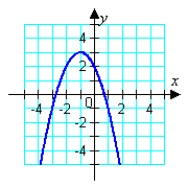
B)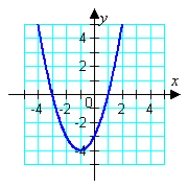
C)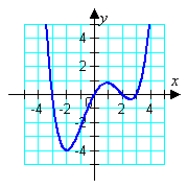
D)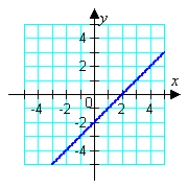
E)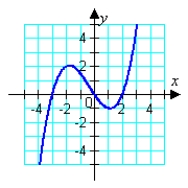

A)

B)

C)

D)

E)


Unlock Deck
Unlock for access to all 84 flashcards in this deck.
Unlock Deck
k this deck
18
Using a graphing utility, graph  and approximate the zeros and their multiplicity.
and approximate the zeros and their multiplicity.
A) , multiplicity 1;
, multiplicity 1;  , multiplicity 2
, multiplicity 2
B) , multiplicity 1;
, multiplicity 1;  , multiplicity 1;
, multiplicity 1;  , multiplicity 1
, multiplicity 1
C) , multiplicity 2;
, multiplicity 2;  , multiplicity 1
, multiplicity 1
D) , multiplicity 3
, multiplicity 3
E) , multiplicity 2;
, multiplicity 2;  , multiplicity 1
, multiplicity 1
 and approximate the zeros and their multiplicity.
and approximate the zeros and their multiplicity.A)
 , multiplicity 1;
, multiplicity 1;  , multiplicity 2
, multiplicity 2B)
 , multiplicity 1;
, multiplicity 1;  , multiplicity 1;
, multiplicity 1;  , multiplicity 1
, multiplicity 1C)
 , multiplicity 2;
, multiplicity 2;  , multiplicity 1
, multiplicity 1D)
 , multiplicity 3
, multiplicity 3E)
 , multiplicity 2;
, multiplicity 2;  , multiplicity 1
, multiplicity 1
Unlock Deck
Unlock for access to all 84 flashcards in this deck.
Unlock Deck
k this deck
19
Write the standard form of the equation of the parabola that has a vertex at  and passes through the point
and passes through the point  .
.
A)
B)
C)
D)
E)
 and passes through the point
and passes through the point  .
.A)

B)

C)

D)

E)


Unlock Deck
Unlock for access to all 84 flashcards in this deck.
Unlock Deck
k this deck
20
Find all real zeros of the polynomial  and determine the mutiplicity of each.
and determine the mutiplicity of each.
A) , multiplicity 2;
, multiplicity 2;  , multiplicity 1;
, multiplicity 1;  , multiplicity 1
, multiplicity 1
B) , multiplicity 2;
, multiplicity 2;  , multiplicity 2
, multiplicity 2
C) , multiplicity 2;
, multiplicity 2;  , multiplicity 1;
, multiplicity 1;  , multiplicity 1
, multiplicity 1
D) , multiplicity 2;
, multiplicity 2;  , multiplicity 2
, multiplicity 2
E) , multiplicity 1;
, multiplicity 1;  , multiplicity 1;
, multiplicity 1;  , multiplicity 1;
, multiplicity 1;  , multiplicity 1
, multiplicity 1
 and determine the mutiplicity of each.
and determine the mutiplicity of each.A)
 , multiplicity 2;
, multiplicity 2;  , multiplicity 1;
, multiplicity 1;  , multiplicity 1
, multiplicity 1B)
 , multiplicity 2;
, multiplicity 2;  , multiplicity 2
, multiplicity 2C)
 , multiplicity 2;
, multiplicity 2;  , multiplicity 1;
, multiplicity 1;  , multiplicity 1
, multiplicity 1D)
 , multiplicity 2;
, multiplicity 2;  , multiplicity 2
, multiplicity 2E)
 , multiplicity 1;
, multiplicity 1;  , multiplicity 1;
, multiplicity 1;  , multiplicity 1;
, multiplicity 1;  , multiplicity 1
, multiplicity 1
Unlock Deck
Unlock for access to all 84 flashcards in this deck.
Unlock Deck
k this deck
21
Use synthetic division to divide. 
A)
B)
C)
D)
E)

A)

B)

C)

D)

E)


Unlock Deck
Unlock for access to all 84 flashcards in this deck.
Unlock Deck
k this deck
22
If  is a root of
is a root of  , use synthetic division to factor the polynomial completely and list all real solutions of the equation.
, use synthetic division to factor the polynomial completely and list all real solutions of the equation.
A) ;
; 
B) ;
; 
C) ;
; 
D) ;
; 
E) ;
; 
 is a root of
is a root of  , use synthetic division to factor the polynomial completely and list all real solutions of the equation.
, use synthetic division to factor the polynomial completely and list all real solutions of the equation.A)
 ;
; 
B)
 ;
; 
C)
 ;
; 
D)
 ;
; 
E)
 ;
; 

Unlock Deck
Unlock for access to all 84 flashcards in this deck.
Unlock Deck
k this deck
23
Use synthetic division to divide. 
A)
B)
C)
D)
E)

A)

B)

C)

D)

E)


Unlock Deck
Unlock for access to all 84 flashcards in this deck.
Unlock Deck
k this deck
24
Use synthetic division to divide. 
A)
B)
C)
D)
E)

A)

B)

C)

D)

E)


Unlock Deck
Unlock for access to all 84 flashcards in this deck.
Unlock Deck
k this deck
25
Write  in the form
in the form  when
when  .
.
A)
B)
C)
D)
E)
 in the form
in the form  when
when  .
.A)

B)

C)

D)

E)


Unlock Deck
Unlock for access to all 84 flashcards in this deck.
Unlock Deck
k this deck
26
Find all real zeros of the polynomial  and determine the mutiplicity of each.
and determine the mutiplicity of each.
A) , multiplicity 2;
, multiplicity 2;  , multiplicity 1
, multiplicity 1
B) , multiplicity 1;
, multiplicity 1;  , multiplicity 1;
, multiplicity 1;  , multiplicity 1
, multiplicity 1
C) , multiplicity 2;
, multiplicity 2;  , multiplicity 1
, multiplicity 1
D) , multiplicity 1;
, multiplicity 1;  , multiplicity 1;
, multiplicity 1;  , multiplicity 1
, multiplicity 1
E) , multiplicity 3
, multiplicity 3
 and determine the mutiplicity of each.
and determine the mutiplicity of each.A)
 , multiplicity 2;
, multiplicity 2;  , multiplicity 1
, multiplicity 1B)
 , multiplicity 1;
, multiplicity 1;  , multiplicity 1;
, multiplicity 1;  , multiplicity 1
, multiplicity 1C)
 , multiplicity 2;
, multiplicity 2;  , multiplicity 1
, multiplicity 1D)
 , multiplicity 1;
, multiplicity 1;  , multiplicity 1;
, multiplicity 1;  , multiplicity 1
, multiplicity 1E)
 , multiplicity 3
, multiplicity 3
Unlock Deck
Unlock for access to all 84 flashcards in this deck.
Unlock Deck
k this deck
27
Use synthetic division to divide. 
A)
B)
C)
D)
E)

A)

B)

C)

D)

E)


Unlock Deck
Unlock for access to all 84 flashcards in this deck.
Unlock Deck
k this deck
28
Using the factors  and
and  , find the remaining factor(s) of
, find the remaining factor(s) of  and write the polynomial in fully factored form.
and write the polynomial in fully factored form.
A)
B)
C)
D)
E)
 and
and  , find the remaining factor(s) of
, find the remaining factor(s) of  and write the polynomial in fully factored form.
and write the polynomial in fully factored form.A)

B)

C)

D)

E)


Unlock Deck
Unlock for access to all 84 flashcards in this deck.
Unlock Deck
k this deck
29
Use long division to divide. 
A)
B)
C)
D)
E)

A)

B)

C)

D)

E)


Unlock Deck
Unlock for access to all 84 flashcards in this deck.
Unlock Deck
k this deck
30
Write  in the form
in the form  when
when  .
.
A)
B)
C)
D)
E)
 in the form
in the form  when
when  .
.A)

B)

C)

D)

E)


Unlock Deck
Unlock for access to all 84 flashcards in this deck.
Unlock Deck
k this deck
31
Use long division to divide. 
A)
B)
C)
D)
E)

A)

B)

C)

D)

E)


Unlock Deck
Unlock for access to all 84 flashcards in this deck.
Unlock Deck
k this deck
32
Use long division to divide. 
A)
B)
C)
D)
E)

A)

B)

C)

D)

E)


Unlock Deck
Unlock for access to all 84 flashcards in this deck.
Unlock Deck
k this deck
33
If  , use synthetic division to evaluate
, use synthetic division to evaluate  .
.
A)
B)
C)
D)
E)
 , use synthetic division to evaluate
, use synthetic division to evaluate  .
.A)

B)

C)

D)

E)


Unlock Deck
Unlock for access to all 84 flashcards in this deck.
Unlock Deck
k this deck
34
Using the factors  and
and  , find the remaining factor(s) of
, find the remaining factor(s) of  and write the polynomial in fully factored form.
and write the polynomial in fully factored form.
A)
B)
C)
D)
E)
 and
and  , find the remaining factor(s) of
, find the remaining factor(s) of  and write the polynomial in fully factored form.
and write the polynomial in fully factored form.A)

B)

C)

D)

E)


Unlock Deck
Unlock for access to all 84 flashcards in this deck.
Unlock Deck
k this deck
35
Use long division to divide. 
A)
B)
C)
D)
E)

A)

B)

C)

D)

E)


Unlock Deck
Unlock for access to all 84 flashcards in this deck.
Unlock Deck
k this deck
36
Find all real zeros of the polynomial  and determine the mutiplicity of each.
and determine the mutiplicity of each.
A) , multiplicity 2;
, multiplicity 2;  , multiplicity 2
, multiplicity 2
B) , multiplicity 2;
, multiplicity 2;  , multiplicity 2
, multiplicity 2
C) , multiplicity 2;
, multiplicity 2;  , multiplicity 1
, multiplicity 1
D) , multiplicity 2;
, multiplicity 2;  , multiplicity 2
, multiplicity 2
E) , multiplicity 1;
, multiplicity 1;  , multiplicity 1;
, multiplicity 1;  , multiplicity 1;
, multiplicity 1;  , multiplicity 1
, multiplicity 1
 and determine the mutiplicity of each.
and determine the mutiplicity of each.A)
 , multiplicity 2;
, multiplicity 2;  , multiplicity 2
, multiplicity 2B)
 , multiplicity 2;
, multiplicity 2;  , multiplicity 2
, multiplicity 2C)
 , multiplicity 2;
, multiplicity 2;  , multiplicity 1
, multiplicity 1D)
 , multiplicity 2;
, multiplicity 2;  , multiplicity 2
, multiplicity 2E)
 , multiplicity 1;
, multiplicity 1;  , multiplicity 1;
, multiplicity 1;  , multiplicity 1;
, multiplicity 1;  , multiplicity 1
, multiplicity 1
Unlock Deck
Unlock for access to all 84 flashcards in this deck.
Unlock Deck
k this deck
37
If  is a root of
is a root of  , use synthetic division to factor the polynomial completely and list all real solutions of the equation.
, use synthetic division to factor the polynomial completely and list all real solutions of the equation.
A) ;
; 
B) ;
; 
C) ;
; 
D) ;
; 
E) ;
; 
 is a root of
is a root of  , use synthetic division to factor the polynomial completely and list all real solutions of the equation.
, use synthetic division to factor the polynomial completely and list all real solutions of the equation.A)
 ;
; 
B)
 ;
; 
C)
 ;
; 
D)
 ;
; 
E)
 ;
; 

Unlock Deck
Unlock for access to all 84 flashcards in this deck.
Unlock Deck
k this deck
38
Use synthetic division to divide. 
A)
B)
C)
D)
E)

A)

B)

C)

D)

E)


Unlock Deck
Unlock for access to all 84 flashcards in this deck.
Unlock Deck
k this deck
39
Use the zero or root feature of a graphing utility to approximate the zeros of  accurate to the nearest thousandth.
accurate to the nearest thousandth.
A)
B)
C)
D)
E)
 accurate to the nearest thousandth.
accurate to the nearest thousandth.A)

B)

C)

D)

E)


Unlock Deck
Unlock for access to all 84 flashcards in this deck.
Unlock Deck
k this deck
40
If  is a root of
is a root of  , use synthetic division to factor the polynomial completely and list all real solutions of the equation.
, use synthetic division to factor the polynomial completely and list all real solutions of the equation.
A) ;
; 
B) ;
; 
C) ;
; 
D) ;
; 
E) ;
; 
 is a root of
is a root of  , use synthetic division to factor the polynomial completely and list all real solutions of the equation.
, use synthetic division to factor the polynomial completely and list all real solutions of the equation.A)
 ;
; 
B)
 ;
; 
C)
 ;
; 
D)
 ;
; 
E)
 ;
; 

Unlock Deck
Unlock for access to all 84 flashcards in this deck.
Unlock Deck
k this deck
41
Find all real solutions of the polynomial equation  .
.
A)
B)
C)
D)
E)
 .
.A)

B)

C)

D)

E)


Unlock Deck
Unlock for access to all 84 flashcards in this deck.
Unlock Deck
k this deck
42
Use the quadratic formula to solve  .
.
A)
B)
C)
D)
E)
 .
.A)

B)

C)

D)

E)


Unlock Deck
Unlock for access to all 84 flashcards in this deck.
Unlock Deck
k this deck
43
Simplify  and write the answer in standard form.
and write the answer in standard form.
A)
B)
C)
D)
E)
 and write the answer in standard form.
and write the answer in standard form.A)

B)

C)

D)

E)


Unlock Deck
Unlock for access to all 84 flashcards in this deck.
Unlock Deck
k this deck
44
Write the complex conjugate of the complex number  .
.
A)
B)
C)
D)
E)
 .
.A)

B)

C)

D)

E)


Unlock Deck
Unlock for access to all 84 flashcards in this deck.
Unlock Deck
k this deck
45
Simplify the rational expression,  , by using long division or synthetic division.
, by using long division or synthetic division.
A)
B)
C)
D)
E)
 , by using long division or synthetic division.
, by using long division or synthetic division.A)

B)

C)

D)

E)


Unlock Deck
Unlock for access to all 84 flashcards in this deck.
Unlock Deck
k this deck
46
Combine  and write the answer in standard form.
and write the answer in standard form.
A)
B)
C)
D)
E)
 and write the answer in standard form.
and write the answer in standard form.A)

B)

C)

D)

E)


Unlock Deck
Unlock for access to all 84 flashcards in this deck.
Unlock Deck
k this deck
47
Simplify  and write the answer in standard form.
and write the answer in standard form.
A)
B)
C)
D)
E)
 and write the answer in standard form.
and write the answer in standard form.A)

B)

C)

D)

E)


Unlock Deck
Unlock for access to all 84 flashcards in this deck.
Unlock Deck
k this deck
48
Find all zeros of the function  .
.
A)
B)
C)
D)
E)
 .
.A)

B)

C)

D)

E)


Unlock Deck
Unlock for access to all 84 flashcards in this deck.
Unlock Deck
k this deck
49
Find all zeros of the function  .
.
A)
B)
C)
D)
E)
 .
.A)

B)

C)

D)

E)


Unlock Deck
Unlock for access to all 84 flashcards in this deck.
Unlock Deck
k this deck
50
Simplify  and write the answer in standard form.
and write the answer in standard form.
A)
B)
C)
D)
E)
 and write the answer in standard form.
and write the answer in standard form.A)

B)

C)

D)

E)


Unlock Deck
Unlock for access to all 84 flashcards in this deck.
Unlock Deck
k this deck
51
Write the complex number  in standard form.
in standard form.
A)
B)
C)
D)
E)
 in standard form.
in standard form.A)

B)

C)

D)

E)


Unlock Deck
Unlock for access to all 84 flashcards in this deck.
Unlock Deck
k this deck
52
Find real numbers a and b such that the equation  is true.
is true.
A)
B)
C)
D)
E)
 is true.
is true.A)

B)

C)

D)

E)


Unlock Deck
Unlock for access to all 84 flashcards in this deck.
Unlock Deck
k this deck
53
Simplify  and write the answer in standard form.
and write the answer in standard form.
A)
B)
C)
D)
E)The expression cannot be simplified.
 and write the answer in standard form.
and write the answer in standard form.A)

B)

C)

D)

E)The expression cannot be simplified.

Unlock Deck
Unlock for access to all 84 flashcards in this deck.
Unlock Deck
k this deck
54
Combine  and write the answer in standard form.
and write the answer in standard form.
A)
B)
C)
D)
E)
 and write the answer in standard form.
and write the answer in standard form.A)

B)

C)

D)

E)


Unlock Deck
Unlock for access to all 84 flashcards in this deck.
Unlock Deck
k this deck
55
Find all real solutions of the polynomial equation  .
.
A)

B)
C)
D)
E)
 .
.A)


B)

C)

D)

E)


Unlock Deck
Unlock for access to all 84 flashcards in this deck.
Unlock Deck
k this deck
56
Find all the rational zeros of the function  .
.
A)
B)
C)
D)
E)
 .
.A)

B)

C)

D)

E)


Unlock Deck
Unlock for access to all 84 flashcards in this deck.
Unlock Deck
k this deck
57
Simplify  and write the answer in standard form.
and write the answer in standard form.
A)
B)
C)
D)
E)
 and write the answer in standard form.
and write the answer in standard form.A)

B)

C)

D)

E)


Unlock Deck
Unlock for access to all 84 flashcards in this deck.
Unlock Deck
k this deck
58
Use the quadratic formula to solve  .
.
A)
B)
C)
D)
E)
 .
.A)

B)

C)

D)

E)


Unlock Deck
Unlock for access to all 84 flashcards in this deck.
Unlock Deck
k this deck
59
Simplify the rational expression,  , by using long division or synthetic division.
, by using long division or synthetic division.
A)
B)
C)
D)
E)
 , by using long division or synthetic division.
, by using long division or synthetic division.A)

B)

C)

D)

E)


Unlock Deck
Unlock for access to all 84 flashcards in this deck.
Unlock Deck
k this deck
60
Simplify: 
A)
B)
C)
D)
E)

A)

B)

C)

D)

E)


Unlock Deck
Unlock for access to all 84 flashcards in this deck.
Unlock Deck
k this deck
61
Consider the function  . Identify any slant asymptotes.
. Identify any slant asymptotes.
A)
B)
C)
D)
E)
 . Identify any slant asymptotes.
. Identify any slant asymptotes.A)

B)

C)

D)

E)


Unlock Deck
Unlock for access to all 84 flashcards in this deck.
Unlock Deck
k this deck
62
Consider the function  . Find the function's domain and identify any horizontal and vertical asymptotes.
. Find the function's domain and identify any horizontal and vertical asymptotes.
A)domain: all real numbers x except for ; vertical asymptote:
; vertical asymptote:  ; horizontal asymptote:
; horizontal asymptote: 
B)domain: all real numbers x except for ; vertical asymptote:
; vertical asymptote:  ; horizontal asymptote:
; horizontal asymptote: 
C)domain: all real numbers x except for ; vertical asymptote:
; vertical asymptote:  ; horizontal asymptote:
; horizontal asymptote: 
D)domain: all real numbers x except for ; vertical asymptote:
; vertical asymptote:  ; horizontal asymptote:
; horizontal asymptote: 
E)domain: all real numbers x except for ; vertical asymptote:
; vertical asymptote:  ; horizontal asymptote:
; horizontal asymptote: 
 . Find the function's domain and identify any horizontal and vertical asymptotes.
. Find the function's domain and identify any horizontal and vertical asymptotes.A)domain: all real numbers x except for
 ; vertical asymptote:
; vertical asymptote:  ; horizontal asymptote:
; horizontal asymptote: 
B)domain: all real numbers x except for
 ; vertical asymptote:
; vertical asymptote:  ; horizontal asymptote:
; horizontal asymptote: 
C)domain: all real numbers x except for
 ; vertical asymptote:
; vertical asymptote:  ; horizontal asymptote:
; horizontal asymptote: 
D)domain: all real numbers x except for
 ; vertical asymptote:
; vertical asymptote:  ; horizontal asymptote:
; horizontal asymptote: 
E)domain: all real numbers x except for
 ; vertical asymptote:
; vertical asymptote:  ; horizontal asymptote:
; horizontal asymptote: 

Unlock Deck
Unlock for access to all 84 flashcards in this deck.
Unlock Deck
k this deck
63
Use the zero or root feature of a graphing utility to approximate the zeros of the function  accurate to the nearest thousandth.
accurate to the nearest thousandth.
A) , 2.646, 2.449
, 2.646, 2.449
B) , -2.646, -2.449
, -2.646, -2.449
C) ,
,  2.646,
2.646,  2.449
2.449
D)2.646, 2.449
E) , - 2.646, 2.449
, - 2.646, 2.449
 accurate to the nearest thousandth.
accurate to the nearest thousandth.A)
 , 2.646, 2.449
, 2.646, 2.449B)
 , -2.646, -2.449
, -2.646, -2.449C)
 ,
,  2.646,
2.646,  2.449
2.449D)2.646, 2.449
E)
 , - 2.646, 2.449
, - 2.646, 2.449
Unlock Deck
Unlock for access to all 84 flashcards in this deck.
Unlock Deck
k this deck
64
Find all the real zeros of  .
.
A)
B)
C)
D)
E)
 .
.A)

B)

C)

D)

E)


Unlock Deck
Unlock for access to all 84 flashcards in this deck.
Unlock Deck
k this deck
65
Given  is a root, determine all other roots of
is a root, determine all other roots of  .
.
A)
B)
C)
D)
E)
 is a root, determine all other roots of
is a root, determine all other roots of  .
.A)

B)

C)

D)

E)


Unlock Deck
Unlock for access to all 84 flashcards in this deck.
Unlock Deck
k this deck
66
Consider the function  . Identify any slant asymptotes.
. Identify any slant asymptotes.
A)
B)
C)
D)
E)
 . Identify any slant asymptotes.
. Identify any slant asymptotes.A)

B)

C)

D)

E)


Unlock Deck
Unlock for access to all 84 flashcards in this deck.
Unlock Deck
k this deck
67
Consider the function  . Find the function's domain and identify any horizontal and vertical asymptotes.
. Find the function's domain and identify any horizontal and vertical asymptotes.
A)domain: all real numbers x except for ; vertical asymptote:
; vertical asymptote:  ; horizontal asymptote:
; horizontal asymptote: 
B)domain: all real numbers x except for and
and  ; vertical asymptote:
; vertical asymptote:  ; horizontal asymptote:
; horizontal asymptote: 
C)domain: all real numbers x except for ; vertical asymptote:
; vertical asymptote:  and
and  ; horizontal asymptote:
; horizontal asymptote: 
D)domain: all real numbers x except for ; vertical asymptote:
; vertical asymptote:  and
and  ; horizontal asymptote:
; horizontal asymptote: 
E)domain: all real numbers x except for and
and  ; vertical asymptote:
; vertical asymptote:  ; horizontal asymptote:
; horizontal asymptote: 
 . Find the function's domain and identify any horizontal and vertical asymptotes.
. Find the function's domain and identify any horizontal and vertical asymptotes.A)domain: all real numbers x except for
 ; vertical asymptote:
; vertical asymptote:  ; horizontal asymptote:
; horizontal asymptote: 
B)domain: all real numbers x except for
 and
and  ; vertical asymptote:
; vertical asymptote:  ; horizontal asymptote:
; horizontal asymptote: 
C)domain: all real numbers x except for
 ; vertical asymptote:
; vertical asymptote:  and
and  ; horizontal asymptote:
; horizontal asymptote: 
D)domain: all real numbers x except for
 ; vertical asymptote:
; vertical asymptote:  and
and  ; horizontal asymptote:
; horizontal asymptote: 
E)domain: all real numbers x except for
 and
and  ; vertical asymptote:
; vertical asymptote:  ; horizontal asymptote:
; horizontal asymptote: 

Unlock Deck
Unlock for access to all 84 flashcards in this deck.
Unlock Deck
k this deck
68
Consider the function  . Find the function's domain and identify any horizontal and vertical asymptotes.
. Find the function's domain and identify any horizontal and vertical asymptotes.
A)domain: all real numbers; vertical asymptote: ; horizontal asymptote: none
; horizontal asymptote: none
B)domain: all real numbers; vertical asymptote: none; horizontal asymptote:
C)domain: all real numbers except ; vertical asymptote:
; vertical asymptote:  ; horizontal asymptote:
; horizontal asymptote: 
D)domain: all real numbers; vertical asymptote: none; horizontal asymptote:
E)domain: all real numbers except ; vertical asymptote:
; vertical asymptote:  ; horizontal asymptote:
; horizontal asymptote: 
 . Find the function's domain and identify any horizontal and vertical asymptotes.
. Find the function's domain and identify any horizontal and vertical asymptotes.A)domain: all real numbers; vertical asymptote:
 ; horizontal asymptote: none
; horizontal asymptote: noneB)domain: all real numbers; vertical asymptote: none; horizontal asymptote:

C)domain: all real numbers except
 ; vertical asymptote:
; vertical asymptote:  ; horizontal asymptote:
; horizontal asymptote: 
D)domain: all real numbers; vertical asymptote: none; horizontal asymptote:

E)domain: all real numbers except
 ; vertical asymptote:
; vertical asymptote:  ; horizontal asymptote:
; horizontal asymptote: 

Unlock Deck
Unlock for access to all 84 flashcards in this deck.
Unlock Deck
k this deck
69
Consider the function  . Find the function's domain and identify any horizontal and vertical asymptotes.
. Find the function's domain and identify any horizontal and vertical asymptotes.
A)domain: all real numbers x except for ; vertical asymptote:
; vertical asymptote:  ; horizontal asymptote:
; horizontal asymptote: 
B)domain: all real numbers x except for and
and  ; vertical asymptotes:
; vertical asymptotes:  and
and  ; horizontal asymptote:
; horizontal asymptote: 
C)domain: all real numbers x except for and
and  ; vertical asymptote:
; vertical asymptote:  ; horizontal asymptote:
; horizontal asymptote: 
D)domain: all real numbers x except for and
and  ; vertical asymptote:
; vertical asymptote:  ; horizontal asymptote:
; horizontal asymptote: 
E)domain: all real numbers x except for ; vertical asymptote:
; vertical asymptote:  ; horizontal asymptote:
; horizontal asymptote: 
 . Find the function's domain and identify any horizontal and vertical asymptotes.
. Find the function's domain and identify any horizontal and vertical asymptotes.A)domain: all real numbers x except for
 ; vertical asymptote:
; vertical asymptote:  ; horizontal asymptote:
; horizontal asymptote: 
B)domain: all real numbers x except for
 and
and  ; vertical asymptotes:
; vertical asymptotes:  and
and  ; horizontal asymptote:
; horizontal asymptote: 
C)domain: all real numbers x except for
 and
and  ; vertical asymptote:
; vertical asymptote:  ; horizontal asymptote:
; horizontal asymptote: 
D)domain: all real numbers x except for
 and
and  ; vertical asymptote:
; vertical asymptote:  ; horizontal asymptote:
; horizontal asymptote: 
E)domain: all real numbers x except for
 ; vertical asymptote:
; vertical asymptote:  ; horizontal asymptote:
; horizontal asymptote: 

Unlock Deck
Unlock for access to all 84 flashcards in this deck.
Unlock Deck
k this deck
70
Write  as a product of linear factors.
as a product of linear factors.
A)
B)
C)
D)
E)
 as a product of linear factors.
as a product of linear factors.A)

B)

C)

D)

E)


Unlock Deck
Unlock for access to all 84 flashcards in this deck.
Unlock Deck
k this deck
71
Find all the real zeros of  .
.
A)
B)
C)
D)
E)
 .
.A)

B)

C)

D)

E)


Unlock Deck
Unlock for access to all 84 flashcards in this deck.
Unlock Deck
k this deck
72
Given  is a root, determine all other roots of
is a root, determine all other roots of  .
.
A)
B)
C)
D)
E)
 is a root, determine all other roots of
is a root, determine all other roots of  .
.A)

B)

C)

D)

E)


Unlock Deck
Unlock for access to all 84 flashcards in this deck.
Unlock Deck
k this deck
73
Identify the function whose graph is provided. 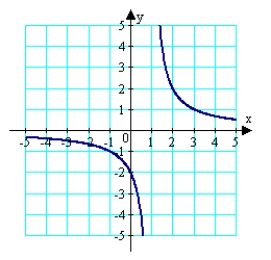
A)
B)
C)
D)
E)

A)

B)

C)

D)

E)


Unlock Deck
Unlock for access to all 84 flashcards in this deck.
Unlock Deck
k this deck
74
Consider the function  . Find the function's domain and identify any horizontal and vertical asymptotes.
. Find the function's domain and identify any horizontal and vertical asymptotes.
A)domain: all real numbers x except for ; vertical asymptote:
; vertical asymptote:  ; horizontal asymptote:
; horizontal asymptote: 
B)domain: all real numbers x except for ; vertical asymptote:
; vertical asymptote:  ; horizontal asymptote:
; horizontal asymptote: 
C)domain: all real numbers x except for ; vertical asymptote:
; vertical asymptote:  ; horizontal asymptote:
; horizontal asymptote: 
D)domain: all real numbers x except for ; vertical asymptote:
; vertical asymptote:  ; horizontal asymptote:
; horizontal asymptote: 
E)domain: all real numbers x except for ; vertical asymptote:
; vertical asymptote:  ; horizontal asymptote:
; horizontal asymptote: 
 . Find the function's domain and identify any horizontal and vertical asymptotes.
. Find the function's domain and identify any horizontal and vertical asymptotes.A)domain: all real numbers x except for
 ; vertical asymptote:
; vertical asymptote:  ; horizontal asymptote:
; horizontal asymptote: 
B)domain: all real numbers x except for
 ; vertical asymptote:
; vertical asymptote:  ; horizontal asymptote:
; horizontal asymptote: 
C)domain: all real numbers x except for
 ; vertical asymptote:
; vertical asymptote:  ; horizontal asymptote:
; horizontal asymptote: 
D)domain: all real numbers x except for
 ; vertical asymptote:
; vertical asymptote:  ; horizontal asymptote:
; horizontal asymptote: 
E)domain: all real numbers x except for
 ; vertical asymptote:
; vertical asymptote:  ; horizontal asymptote:
; horizontal asymptote: 

Unlock Deck
Unlock for access to all 84 flashcards in this deck.
Unlock Deck
k this deck
75
Consider the function  . Find the function's domain and identify any horizontal and vertical asymptotes.
. Find the function's domain and identify any horizontal and vertical asymptotes.
A)domain: all real numbers x except for and
and  ; vertical asymptote:
; vertical asymptote:  ; horizontal asymptote:
; horizontal asymptote: 
B)domain: all real numbers x except for ; vertical asymptote:
; vertical asymptote:  ; horizontal asymptote:
; horizontal asymptote: 
C)domain: all real numbers x except for ; vertical asymptotes:
; vertical asymptotes:  and
and  ; horizontal asymptote: none
; horizontal asymptote: none
D)domain: all real numbers x except for and
and  ; vertical asymptotes:
; vertical asymptotes:  and
and  ; horizontal asymptote:
; horizontal asymptote: 
E)domain: all real numbers x except for and
and  ; vertical asymptote:
; vertical asymptote:  ; horizontal asymptote: none
; horizontal asymptote: none
 . Find the function's domain and identify any horizontal and vertical asymptotes.
. Find the function's domain and identify any horizontal and vertical asymptotes.A)domain: all real numbers x except for
 and
and  ; vertical asymptote:
; vertical asymptote:  ; horizontal asymptote:
; horizontal asymptote: 
B)domain: all real numbers x except for
 ; vertical asymptote:
; vertical asymptote:  ; horizontal asymptote:
; horizontal asymptote: 
C)domain: all real numbers x except for
 ; vertical asymptotes:
; vertical asymptotes:  and
and  ; horizontal asymptote: none
; horizontal asymptote: noneD)domain: all real numbers x except for
 and
and  ; vertical asymptotes:
; vertical asymptotes:  and
and  ; horizontal asymptote:
; horizontal asymptote: 
E)domain: all real numbers x except for
 and
and  ; vertical asymptote:
; vertical asymptote:  ; horizontal asymptote: none
; horizontal asymptote: none
Unlock Deck
Unlock for access to all 84 flashcards in this deck.
Unlock Deck
k this deck
76
Find the zeros (if any) of the rational function  .
.
A)
B)
C) and
and 
D)
E)There are no zeros.
 .
.A)

B)

C)
 and
and 
D)

E)There are no zeros.

Unlock Deck
Unlock for access to all 84 flashcards in this deck.
Unlock Deck
k this deck
77
For the function given below, determine the domain, the x-intercepts, and any vertical and horizontal asymptotes. Use all of this information plus any additional solution points as needed to sketch the graph of the function. 
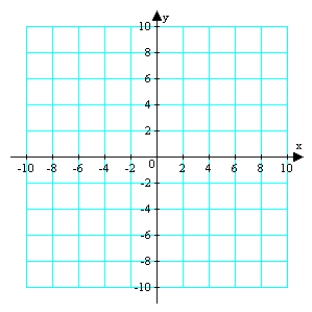
A)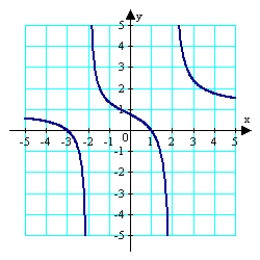
B)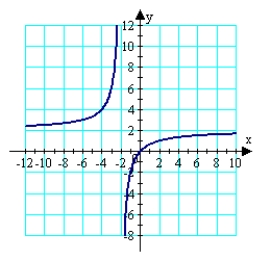
C)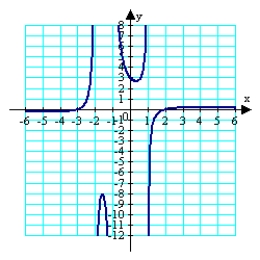
D)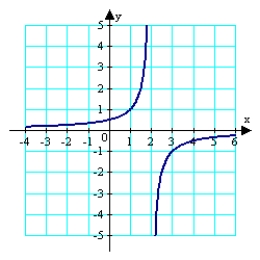
E)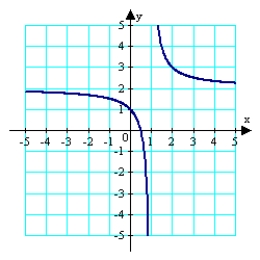


A)

B)

C)

D)

E)


Unlock Deck
Unlock for access to all 84 flashcards in this deck.
Unlock Deck
k this deck
78
Write  as a product of linear factors.
as a product of linear factors.
A)
B)
C)
D)
E)
 as a product of linear factors.
as a product of linear factors.A)

B)

C)

D)

E)


Unlock Deck
Unlock for access to all 84 flashcards in this deck.
Unlock Deck
k this deck
79
For the function given below, determine the domain, all x-intercepts, and find any vertical and slant asymptotes. Use all of this information plus any additional solution points as needed to sketch the graph of the function on the axes provided. 
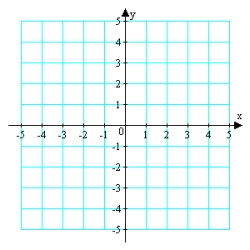
A)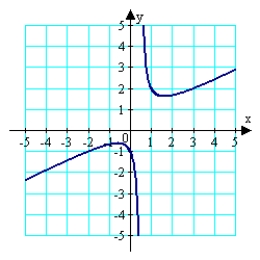
B)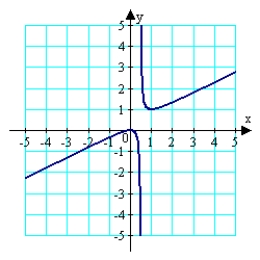
C)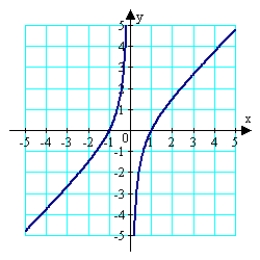
D)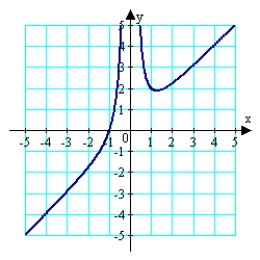
E)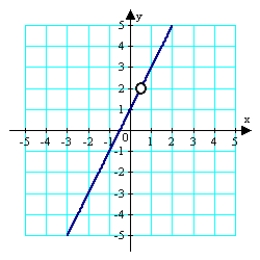


A)

B)

C)

D)

E)


Unlock Deck
Unlock for access to all 84 flashcards in this deck.
Unlock Deck
k this deck
80
Find the zeros (if any) of the rational function  .
.
A) and
and 
B)
C)
D)
E)There are no zeros.
 .
.A)
 and
and 
B)

C)

D)

E)There are no zeros.

Unlock Deck
Unlock for access to all 84 flashcards in this deck.
Unlock Deck
k this deck


